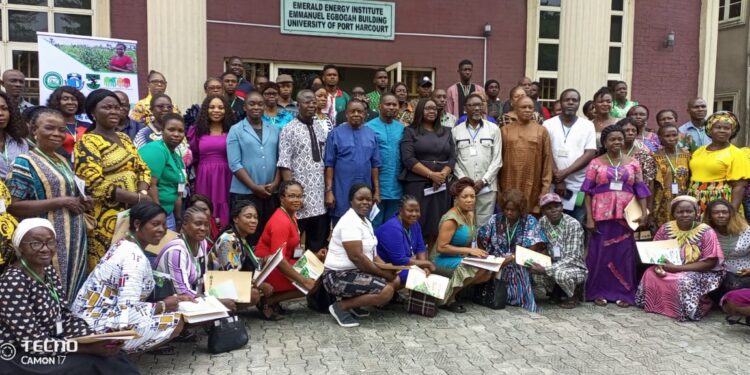Agriculture experts have advocated “smart farming practices” to combat climate change, improve productivity and enhance food security in the country.
They noted that if climate change challenges were not nipped in the bud, more than 52 per cent of the country’s agricultural production would be threatened by 2050.
The experts under the aegis of The Society of Action in Nigeria (SCAN), in collaboration with the University of Port Harcourt, disclosed this during a workshop organized for women and youth leaders on Thursday in Port Harcourt the Rivers state capital.
A Senior Lecturer, Department of Agricultural Extension and Development Studies, University of Port Harcourt, Dr Clara Ifeanyiobi who was the project Lead of the programme, said the aim of the workshop was to equip farmers with adaptative skills on climate change.
She noted that the project was a micro grant from Adaptation Research Alliance to the Society for Climate Action in Nigeria (SCAN) in collaboration with the University of Port Harcourt and the University of Nigeria Nsuka.
According to Ifeanyiobi, when these skills are incorporated in agri-business, huge losses usually associated with climate change would be averted while farmers’ livelihoods would also gain a positive turnaround.
In her words, “Today’s training is tailored to the identified areas of need which is majorly in the area of crop and soil management practices for cassava, maize and vegetable farming”
“We are excited that there will be a huge turnaround in this year’s harvest, we’ve been in the business of equipping farmers with climate smart agricultural practices for over 10 years and our results from our target farmers have been quite laudable.”
“This one is a lot bigger, haven synergized with key agencies like the Nigeria Meteorological Agency (NIMET) and the International Institute of Tropical Agriculture (IIT).”
“Beneficiaries are also expected to go to their various Communities and establish the climate smart rural women and youth groups.”
“We are also going to support the various trainings at the community level. So, we look forward to a bumper harvest across the 23 local councils of the state,” she said.
Ifeanyiobi also stated that improved crop varieties like cassava stems, maize (SC- 526) were also distributed to participants of the workshop (farmers) drawn from the 23 local government areas of the state.
Another resource person, Dr Doris Akachukwu, Senior Lecturer at the Micheal Opara University of Agriculture, Umudike, Abia State, urged the Federal Government to utilise agricultural resources in the country to tackle current food crises .
“Here in Nigeria, we have the land and manpower; rather than desire things that are far fetched, we should put in more commitment and funding for agriculture.
“Nigeria should begin to look inward, fund large scale production to ensure food sufficiency and employment for our teaming youths,” she said.
Akachukwu expressed worry over poor commitment to Agriculture by farmers and youths in the country, adding that lack of basic techniques, seedlings and environmental pollution, effects of green house gases were some of the impediments to Agricultural productivity in the Niger Delta area.
Similarly, Dr Bassey Udom, an Associate Professor, and soil scientist at the University of Port Harcourt, said that the training would help the farmers on innovative soil practices to help cushion climate change.
He also urged the Federal Government to tackle security which he highlighted as key to agricultural prosperity.
Our Correspondent reports that various resource persons in the field of sciences especially soil scientists and crop scientists proffered solutions to some of the challenges and complaints by the participants.
Written by Bon Peters











